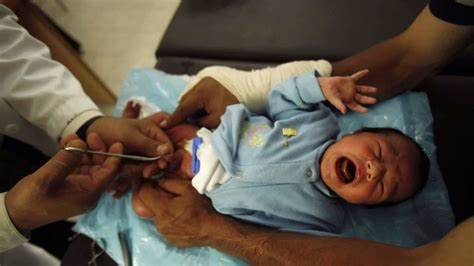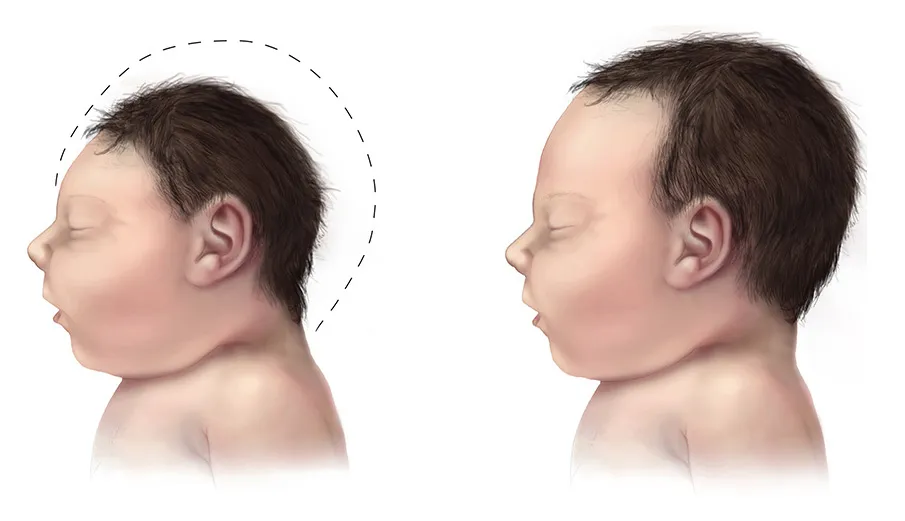Table of Contents
Circumcision is a procedure that takes place within 48–72 hours after a baby boy comes into the world. More often, the procedure is done a day before he comes home. That said, you need to take care of the baby at home to keep him safe from infections.
Caring for your baby at home is critical, especially after a circumcision. The goal is to ensure your baby is comfortable during the healing process. In this article, we will go through the essential steps and everything you need to know about circumcision care. Keep reading!
Do Babies Feel Pain During Circumcision?
It’s not surprising that parents, and especially new moms, will be worried about their newborn baby boy. This question will pop up in your mind: Do babies feel pain during circumcision? The answer is yes.
Your baby can feel extreme pain during a circumcision. Without analgesia, your baby will react in such a manner that they will feel pain and experience pressure. They show behavioral changes such as crying, changes in sleeping patterns, and the like.
Clinically, the medical practitioner may observe the baby’s changes in pulse, circulatory strain, oxygen immersion, cortisol levels, and so on.
Local analgesia must be given to diminish the pain related to the process. Therefore, it can be said that circumcision is an extremely painful procedure.

Procedures in Newborn Circumcision Care
After-circumcision care is an essential part of the process. The days after circumcision are highly critical for your baby. This is because the after-effects of the procedure or medication utilized to help with pain are often severe during this period.
Since the surgery took place in a very sensitive area of the body, it almost takes two to three weeks for a complete healing period. After-circumcision care is essential to safeguard your baby from infection and irritation and avert problems following the procedure.
After the circumcision, the head of the penis appears red and may be very raw. The tip is marginally swollen and reddish. You will also notice a modest quantity of blood stains on the diaper. Then, you will see a slight yellow drainage or hull for two to three days.
The blood stains and yellow drainage afterward are typical healing signs. There’s nothing to worry about. Just make sure to keep the penis always clean and do all other things recommended by the doctor. Not doing so can induce bleeding and may invite diaper rash.
It’s normal for your baby to get irritated and cry when urinating for the first time after a circumcision. Typically, the baby will urinate six to eight hours after the procedure. This irritation should go away after a few days.
Ensure the Penis is Clean
For circumcision after birth, it’s a must to keep the area operated on as sterile and hygienic as possible. Ensure the penis is always clean. Wash the skin area, particularly the penis, with warm water and soapy water if needed.
This is a must since it dramatically reduces the incidence of infection, especially when the wound isn’t completely healed.
Check for Bleeding
Blood staining of the diaper is common. Check your baby’s diaper during the first 24 hours. Spots of blood no bigger than about an inch wide are normal. Otherwise, consult your doctor if you notice more blood.
Bathing
Don’t bathe your newborn immediately. After two to three days, you’re allowed to bathe the baby from top to bottom. Not doing so may cause the penile area to become swollen. Clean the penis with warm water. Then, air-dry the penile area immediately after bathing.
It’s highly important to keep the penis and penile areas dry at all times. Otherwise, if the penis is continuously wet, it induces bacterial growth that leads to irritation and infection.
If you notice the baby experiencing extreme discomfort, discontinue bathing until your doctor tells you to do so.
Diaper Change
There’s a high chance of the first dressing getting removed while changing the diaper since the gauze dressing contains petroleum jelly or any antibiotic cream. Your baby’s doctor will suggest you go for a fresh sauce.
For the first few days, your baby will experience discomfort with every diaper change. It’s recommended, though, to change diapers frequently to reduce the newborn’s chance of developing an infection or any skin irritation.
Also, before diaper changes, it is a must to clean the penis and the penile area. Ensure there’s no stool left on the penis. Clean it with warm water and completely dry it, so there’s no chance of developing an infection.
Take extra care and caution during nappy changes until the wound is completely healed. This lasts for up to two or three weeks.
Apply Barrier Ointment
Apply a topical barrier ointment, such as petroleum jelly, at the tip of the penis after every bath and with each diaper change until the penis is completely healed. The topical barrier prevents the penis from sticking to the diaper.
For the first three to five days after circumcision, put a dash of petroleum jelly on the penis or the diaper. The petroleum jelly acts as a lubricating ointment since the swollen skin comes into direct contact with the diaper.
Your baby will feel uncomfortable due to the skin scouring and adhering to the diaper. Petroleum jelly helps to minimize this discomfort.
Give Pain Relief If Needed
Infants may be fussy and in pain for some hours after circumcision, but this should not last more than a couple of days. The signs of pain include crying and problems with sleep and feeding.
During the first 24 hours after circumcision, you may administer acetaminophen to manage the pain. Also, be aware of how much acetaminophen your baby has received while in the hospital.
Pain Control
It’s not surprising that your newborn will experience some pain after the procedure. To ease the pain, consult your doctor to find out the best baby circumcision pain relief ointment. Doing so will help the treated area heal quickly.
Your doctor will also give you or prescribe certain medications to alleviate the pain. Conversely, you can resort to home remedies. A good one is petroleum jelly. Regular applications to the affected area can provide immediate relief.
Follow Up With Your Baby
As part of the process, it’s highly recommended that you take your newborn to the doctor regularly for at least a few weeks following the circumcision.
Your doctor’s visit will allow you to clarify any doubts you may have about after-circumcision care. You can also discuss if you notice other indications and symptoms that you feel could be related to your baby’s circumcision.
Likewise, the doctor can also physically check if the healing process is on the right track, thus avoiding problems that may arise in the future.

Contraindications After Circumcision
Since babies can’t articulate themselves, you need to be extra cautious and closely observe for symptoms. Consult your doctor if you notice the following:
- Continuous irritation and discomfort when urinating, even after three to five days
- Not peeing regularly within twelve hours after the circumcision
- Increase in redness of the penis
- Green discharge from the penis for more than a week
- Continuous bleeding or more than a quarter-sized amount of blood on the diaper
- Fever
- Indicators of infection such as deterioration, expansion, release, or the presence of discharge-filled blisters
Practically all circumcision-related issues can be easily treated by a clinical professional. Nevertheless, if the procedure is done by qualified and experienced doctors, complications in newborns rarely happen. Even if any problem occurs, it isn’t that serious.
The doctor will provide specific instructions regarding after-circumcision care for your baby. The points outlined above will greatly help clarify your doubts. Taking proper care after circumcision will reduce the chances of further problems.
When is the Best Time to Circumcise a Baby?
Healthcare professionals recommend that two days after the birth of a baby boy is the best time for circumcision.
Most often, the surgical procedure is done a day before the baby is discharged from the hospital. That said, after-circumcision care is mostly done at home.

Keep Your Baby Safe And Comfortable After Circumcision
Most often, circumcision is performed a day before your baby is discharged from the hospital. Hence, while at home, it’s highly important that parents and other caregivers learn about the special care for newborns who have undergone circumcision.
This article hopes to be a great resource for caring for your newborn after circumcision. It has outlined the detailed steps and specific instructions, along with some useful information.
We at Omega Pediatrics ensure that we educate moms and other caregivers on after-circumcision care. The healing process is critical; hence, your baby needs extra care and attention to safeguard him from infection and irritation that may arise due to the procedure.
We at Omega Pediatrics take pride in our expertise in delivering the best pediatric healthcare.
By practicing special care and caution to keep your baby safe while getting the perfect support and medical help when needed, you accelerate the healing process of your baby’s circumcision.
Rest assured, your baby boy will safely get through circumcision.
FAQ
Do newborns feel pain during circumcision?
Yes, without proper analgesia, babies may show signs of discomfort like crying and changes in vital signs.
What are the steps for newborn circumcision care?
Keep the area clean, check for bleeding, bathe after a few days, change diapers often, and apply barrier ointment.
How to ensure cleanliness after circumcision?
Clean with warm water and soap, keep the area dry, apply barrier ointment after cleaning.
How to relieve pain after circumcision?
Consult a doctor for pain relief options, including acetaminophen or prescribed medications.
When to worry about circumcision healing?
Watch for signs like continuous discomfort, absence of urination, increased redness or discharge, excessive bleeding, fever, or signs of infection. Seek medical help if noticed.



